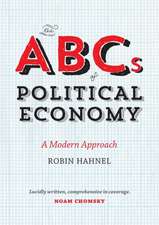Society and Economics in Europe: Disparity versus Convergence?
Editat de Savvas Katsikides, Hardy Hanappien Limba Engleză Paperback – 31 mai 2018
This book takes stock of the lessons to be learned from the experiences of different countries on their way to a transition into a unified Europe. It demonstrates how the project of a unified Europe is a social pilot project that is unique in human history, both with respect to the sheer number of people involved and with respect to the cultural diversity it aims to turn into a progressive advantage. With no historical experience at hand, the transition into a unified Europe is an exploratory process, often risky but sometimes also surprisingly successful. To improve the chances of establishing a successful unification it is particularly important that we learn from the mistakes made so far; and that we learn rapidly, since the forces working against the pilot project of Europe will gain power very fast if the unification success slows down. And as the recent developments in Greece show, the vision of the final goal itself can well change during this exciting quest. Apart from providing the pieces of a mosaic on which a more general theory can be built, this book can be read as a collection of experiences – mistakes as well as triumphs – which should help the European learning process. The structure of the book mirrors Europe’s diversity: specific country studies are combined with more general chapters, and quantitatively oriented econometric work is combined with qualitatively oriented sociological studies.
| Toate formatele și edițiile | Preț | Express |
|---|---|---|
| Paperback (1) | 637.59 lei 6-8 săpt. | |
| Springer International Publishing – 31 mai 2018 | 637.59 lei 6-8 săpt. | |
| Hardback (1) | 643.84 lei 6-8 săpt. | |
| Springer International Publishing – 30 iun 2016 | 643.84 lei 6-8 săpt. |
Preț: 637.59 lei
Preț vechi: 750.11 lei
-15% Nou
Puncte Express: 956
Preț estimativ în valută:
122.01€ • 126.06$ • 101.49£
122.01€ • 126.06$ • 101.49£
Carte tipărită la comandă
Livrare economică 19 martie-02 aprilie
Preluare comenzi: 021 569.72.76
Specificații
ISBN-13: 9783319793429
ISBN-10: 331979342X
Ilustrații: XV, 221 p. 26 illus.
Dimensiuni: 155 x 235 mm
Greutate: 0.34 kg
Ediția:Softcover reprint of the original 1st ed. 2016
Editura: Springer International Publishing
Colecția Springer
Locul publicării:Cham, Switzerland
ISBN-10: 331979342X
Ilustrații: XV, 221 p. 26 illus.
Dimensiuni: 155 x 235 mm
Greutate: 0.34 kg
Ediția:Softcover reprint of the original 1st ed. 2016
Editura: Springer International Publishing
Colecția Springer
Locul publicării:Cham, Switzerland
Cuprins
Introduction.- Chapter 1. Shangri-La Governance. A Sketch of an Integral Solution for European Economic Policy Based on a Synthesis of Europe's Problems; Hardy Hanappi.- Chapter 2. Convergence and Variability of Money and Capital Markets in Selected Eastern European Union countries; Kristis Hasapis.- Chapter 3. Polish Economic Policy, Internationalization, and Globalization; Marian Gorynia.- Chapter 4. A Geopolitical and Institutional Model of Poland's Participation in the New Baltic Europe; Janusz Ruszkowski.- Chapter 5. Main Economic Effects of Poland's Entrance into the European Union; Jaroslaw Kundera.- Chapter 6. Socioeconomic Development in Bulgaria; Mladen Maslarski.-Chapter 7. EU Strategy on the Governance of the Euro Area; Nicholas C. Baltas.- Chapter 8. Questioning the Social Efficiency of Computerazition in an Enlarged Europe: The Lithuanian Case; Kristina Levišauskaitė, Violeta Pukelienė, Jonė Šakalytė, Vytautas Magnus.- Chapter 9. Current Success, Future Headache: Economic Growth in Latvia; Martin Hansen.- Chapter 10. Bulgarian Social Partners and the Inform@tion Society: A cursory Acquaintance; Rumania Gladicheva.- Chapter 11. Regional Integration and the Transformations of Albanian Ethno-Nationalism; Pavlos Ioannis Koktsidis.- Chapter 12. The Dual Character of Hungarian Labor Relations: The Institution of Employee Participation from a European Perspective; Csaba Mako.- Chapter 13. Toward a New Cold War: NATO enlargement, Russia, and the Baltic States; Georgia Yiangou.- Chapter 14. The IT Industry and the Economic Crisis: Empirical Findings from the USA; Konstantinos Vergos, Apolostos G. Christopoulos, Quyan Pan and Petros Kalantonis.- Chapter 15. A Kaleckian Model of New Orders of Non-Defense Capital Goods in the USA 1992-2010; Evangelos Charos, Hossein Kazemi, Anthony J. Laramie and Douglas Mair.
Notă biografică
Savvas Katsikides, (1953), has studied Social/Economic Sciences and Sociology at the Johannes Kepler University of Linz, Austria. He served as Lecturer and Assistant at the University of Technology in Vienna (TU), Austria (1988-1995). He has also held visiting professorships at Leeds Metropolitan University (PRU, UK, 1994-1995), Central Connecticut State University (Dept. of Sociology, USA, 1995), the University of Piraeus (ERASMUS, Greece), and Vienna University of Technology (2002). He lectured at the University of Technology, Limassol. In 2011 Distinguished Visiting Fellow at Queen Mary, University of London. From 1995 to 1998 has served as Assistant Professor at the University of Cyprus, 1998-2007 Associate Professor of Sociology and since 2007 Professor of Sociology. Deputy Dean. Elected President of the Cyprus Sociological Association. (2009-2010).
Hardy Hanappi was born in Vienna (1951) and studied economics and Informatics at the University of Vienna and at the Technical University of Vienna. Before returning to university he has worked as econometrician for OPEC and as CEO for the consulting firm ECON GmbH. He then became university teacher and researcher at the TU-Vienna and concentrated on macroeconomics, political economy, simulation methods and game theory. From 1992 till 1997 he was deputy director of socioeconomics at the Austrian Academy of Sciences. After his return to the TU Vienna he became head of economics, from 2001 till 2005 he also was director of the Institute for Monetary Economics (Ludwig Boltzmann-Institute). He currently is ad personam chair for political economy of European integration, a position granted by the European Commission. He is professorial research associate at SOAS (University of London) where he spent a sabbatical in 2011. Hardy Hanappi now works and lives in Vienna.
Hardy Hanappi was born in Vienna (1951) and studied economics and Informatics at the University of Vienna and at the Technical University of Vienna. Before returning to university he has worked as econometrician for OPEC and as CEO for the consulting firm ECON GmbH. He then became university teacher and researcher at the TU-Vienna and concentrated on macroeconomics, political economy, simulation methods and game theory. From 1992 till 1997 he was deputy director of socioeconomics at the Austrian Academy of Sciences. After his return to the TU Vienna he became head of economics, from 2001 till 2005 he also was director of the Institute for Monetary Economics (Ludwig Boltzmann-Institute). He currently is ad personam chair for political economy of European integration, a position granted by the European Commission. He is professorial research associate at SOAS (University of London) where he spent a sabbatical in 2011. Hardy Hanappi now works and lives in Vienna.
Textul de pe ultima copertă
This book takes stock of the lessons to be learned from the experiences of different countries on their way to a transition into a unified Europe. It demonstrates how the project of a unified Europe is a social pilot project that is unique in human history, both with respect to the sheer number of people involved and with respect to the cultural diversity it aims to turn into a progressive advantage. With no historical experience at hand, the transition into a unified Europe is an exploratory process, often risky but sometimes also surprisingly successful. To improve the chances of establishing a successful unification it is particularly important that we learn from the mistakes made so far; and that we learn rapidly, since the forces working against the pilot project of Europe will gain power very fast if the unification success slows down. And as the recent developments in Greece show, the vision of the final goal itself can well change during this exciting quest. Apart from providing the pieces of a mosaic on which a more general theory can be built, this book can be read as a collection of experiences – mistakes as well as triumphs – which should help the European learning process. The structure of the book mirrors Europe’s diversity: specific country studies are combined with more general chapters, and quantitatively oriented econometric work is combined with qualitatively oriented sociological studies.
Caracteristici
Takes a close look at Europe’s struggle for unification Discusses the advantages and pitfalls of Europe as a democratically governed continent Presents possible solutions to Europe’s most urgent current problems Includes supplementary material: sn.pub/extras














